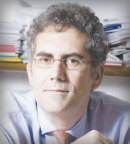Oncologist Angelo Di Leo, MD, PhD, recently died after a long struggle with neurodegenerative disease. He was 58 years old.
Dr. Di Leo was devoted to breast cancer research for more than 25 years. He first trained with Gianni Bonadonna, MD, in Milan, followed by postdoctoral research at Jules Bordet in Belgium. He ultimately led his own research unit, most recently serving as Head of the Sandro Pitigliani Medical Oncology Unit at the Hospital of Prato, Istituto Toscano Tumori in Prato, Italy.
Dr. Di Leo coordinated several pivotal phase III international trials in new adjuvant therapies. He was deeply involved in the evaluation of molecular markers with potential predictive value for breast cancer. The author of many peer-reviewed articles, he lectured extensively at national and international meetings. His outstanding contributions to the field were recognized by the European Society for Medical Oncology, which awarded him its Lifetime Achievement Award in 2019.

Angelo Di Leo, MD, PhD
“We’ve lost one of the brightest stars in international oncology. And not only an established star, which Angelo was, but one who was rising even higher,” said Larry Norton, MD, Founding Scientific Director of the Breast Cancer Research Foundation (BCRF). “In addition to all of his achievements in research, he was a stalwart in BCRF’s partner journal, Nature. He was a great collaborator, colleague, raconteur, and loyal friend. We mourn his untimely passing with the deepest sadness.”
A Leader in Groundbreaking Research
Among his many significant contributions throughout a distinguished career, Dr. Di Leo showed that a gene signature—called RBsig, which reflects a loss of function of the retinoblastoma tumor-suppressor gene—is less likely to respond to chemotherapy and may benefit more from targeted, potentially less-toxic therapies such as cyclin-dependent kinase 4 and 6 inhibitors. His team launched a prospective multicenter, international clinical trial to test the correlation between RBsig and clinical outcomes in older women with estrogen receptor–positive/HER2-positive early-stage breast cancer. Ongoing trials will help inform treatment decisions for the care of older patients with breast cancer by indicating which of them may forgo chemotherapy for less-toxic treatments while preserving optimal clinical outcomes.
Dr. Di Leo’s translational research unit at Prato has also been dedicated to investigating molecular features of circulating tumor cells (CTC). His team demonstrated the ability to isolate single CTCs and then perform whole-genome amplification followed by gene sequencing for mutations of PIK3CA and other relevant genes. This pioneering work has the potential to identify key drivers of resistance and proliferation that could be targeted with therapy.

